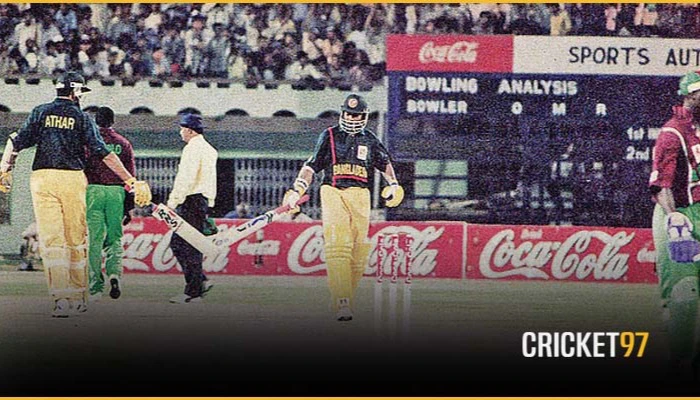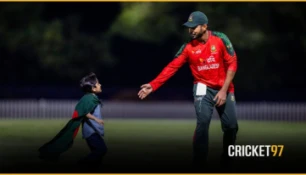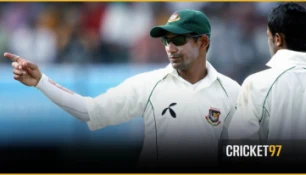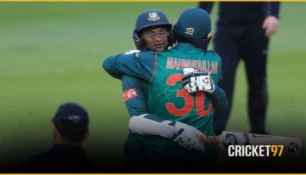Historic May 17: Akram Khan Reminisces Bangladesh’s First ODI Victory
97 Repoter: Shihab Ahsan Khan
Publish: 8 months ago Update: 1 second ago-
1
Pakistan beat Australia by 22 runs in first T20I
-
2
Bangladesh Represented in World Cup Umpire List
-
3
United Arab Emirates to Compete in ICC T20 World Cup under Muhammad Waseem
-
4
Claims of Investigation Against BCB President Baseless, Board Takes Legal Action Over Misinformation
-
5
England beat Sri Lanka in rain-hit encounter

Historic May 17: Akram Khan Reminisces Bangladesh’s First ODI Victory
Historic May 17: Akram Khan Reminisces Bangladesh’s First ODI Victory
Bangladesh began their journey in One Day International cricket in 1986 and suffered 22 consecutive defeats. Then came May 17, 1998—a day that changed the course of the nation's cricket history. The 6-wicket win over Kenya was Bangladesh’s first-ever ODI victory. Today marks the 27th anniversary of that historic moment.
The Coca-Cola Triangular Series featured hosts India along with Bangladesh and Kenya. While Bangladesh lost their opening match to India, they bounced back by defeating Kenya in the second game.
Former skipper Akram Khan, who led the team in that landmark match, recalled the emotions of that day in an interview with Cricket97.
Leading Through Injury
Akram wasn’t even expected to play that day at the Lal Bahadur Shastri Stadium in Hyderabad. He missed the previous game against India due to injury but decided to take the field against Kenya after receiving four injections.
“I couldn’t play against India in Chandigarh (PCA Stadium), but before the Kenya match, I spoke to the manager (Selim Abedin Chowdhury) and took four injections to play. Kenya was a strong side back then with players like Steve Tikolo, Asif Karim, and Hitesh Modi,” Akram recalled.
Confidence from Moin-ud-Dowlah Memories
Kenya posted a total of 236 runs batting first. Mohammad Rafique picked up 3 wickets, while Khaled Mahmud and Enamul Haque Moni took 2 each, and Morshed Ali Khan grabbed 1.
The confidence to chase down the target came from domestic experience at the same ground.
“I had previously played at that Hyderabad ground in the historic Moin-ud-Dowlah Gold Cup and even scored a century there. So I believed this target was achievable,” said Akram.
Rafique-Athar’s Opening Stand
It was only the second time Mohammad Rafique opened the batting in an ODI—the first being a decision made by Akram himself in 1997. This time, Rafique delivered with a career-best 77 off 87 balls, including 11 fours and a six.
Rafique and Athar Ali Khan put on a 137-run opening stand. “The opening stand between Athar and Rafique made our job easier. They gave us a 100+ start (137),” said Akram. Athar played a steady but effective innings of 47 off 91 balls.
Akram-Bulbul Partnership Sealed the Win
At No. 3, Minhajul Abedin Nannu scored 14 runs before Akram joined the crease. The captain played a fluent 39 off 51 balls, including four boundaries. His 62-run stand with Aminul Islam Bulbul all but sealed the game.
Speaking about the partnership, Akram said, “I think I scored more than 30 (39). I played aggressively and told Bulbul to do the same, but he stayed cautious (laughs). Still, he stayed unbeaten and took us over the line.”
Bulbul remained not out on 20*, and Naimur Rahman Durjoy added an unbeaten 4*.
Bangladesh won the match by 6 wickets with two overs to spare. Mohammad Rafique was named Player of the Match for his all-round performance.
Elation and Frustration—Two Poles for Akram
The memory still stirs emotion in Akram Khan, but there is also disappointment regarding the current state of the ODI team.
“After 27 years, I’m not very hopeful about the state of our ODI side. When I was a selector, we were ranked 7th. During my time as BCB’s Cricket Operations Chairman, we even reached 6th. Now the team is 10th!”
While accepting the end of the era of Shakib, Tamim, and Mashrafe, he sees the lack of batting consistency as a major issue.
“Litton and Shanto have the potential to be stars, but without consistency, it’s not possible. Still, there's always hope.”
Akram expressed hope—but that hope needs the fuel of performance. Just as the entire nation erupted with joy 27 years ago, fans now wonder: when will those days return, and how often?



















